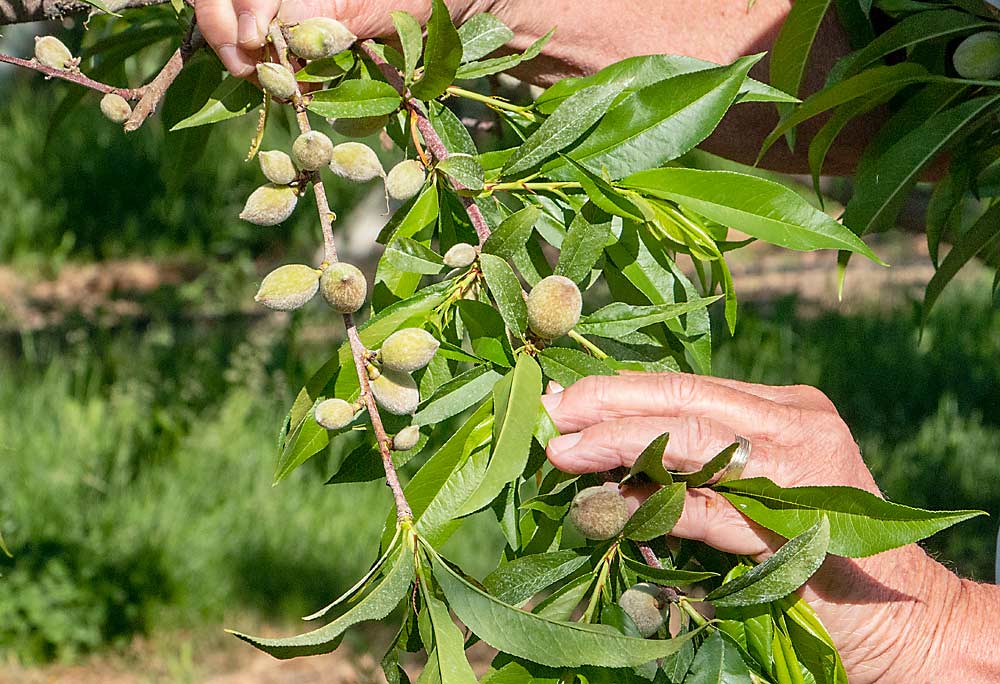
A new plant growth regulator, the first chemical thinner developed specifically for stone fruit, has entered the market, and it also has potential as a late, or “rescue,” thinner of apples, according to researchers.
The Environmental Protection Agency registered Accede (1-aminocyclopropane-1-carboxylic acid), manufactured by Valent BioSciences, as a thinner of apples, peaches and nectarines in 2021. Valent is putting the product on the market this year, starting with peach and nectarine thinning in California, said Steve McArtney, product development manager.
Peaches
Accede won’t completely replace hand thinning of peaches, but it can significantly cut down that laborious task, said Phil Schwallier, a retired Michigan State University Extension educator who has trialed the chemical thinner.
“This is a major breakthrough for thinning stone fruit,” Schwallier said. “For hundreds of years we’ve had to thin these by hand. Now, chemical thinning can reduce that operation.”
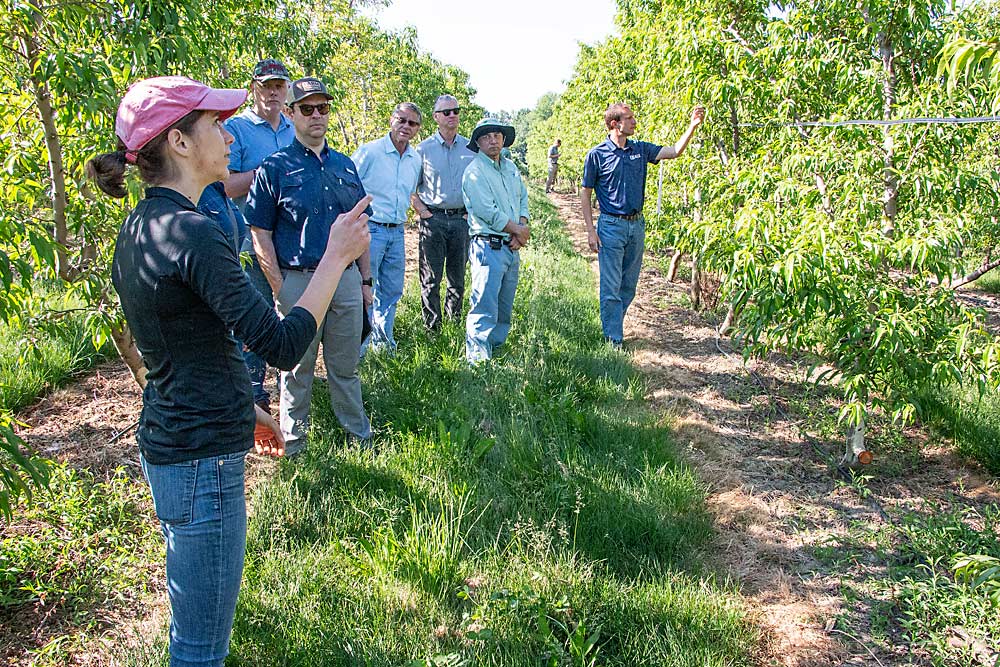
Schwallier and MSU Extension apple production specialist Anna Wallis conducted Accede trials in Michigan peach orchards north of Grand Rapids in 2020 and 2021. Spring freezes killed much of Michigan’s peach crop in 2020, making thinning largely unnecessary, but thinning conditions were more normal in 2021, Wallis said.
Results so far show that a first application of Accede at 20-percent bloom and a second application at 100-percent bloom can result in a significant reduction in fruit, cutting follow-up hand thinning almost by half. And the higher the dose, the greater the thinning effect, Wallis said.
For peaches, Accede has primarily been developed as a bloom thinner. There is a higher likelihood of phytotoxicity with later applications. Some Michigan growers also use handheld mechanical string thinners to thin blossoms, but that’s more time-consuming and expensive than chemical thinning, Wallis said.
The researchers conducted one of the Accede trials at Windy Ridge Orchards in Conklin, Michigan, in 2021, where Chuck Rasch and his son, Kyle, grow about 8 acres of fresh-market peaches. They sprayed Accede on the Starfire, Allstar and PF 23 varieties. Chuck Rasch said Accede had different thinning effects on the different varieties. He thought it thinned Allstar the most.
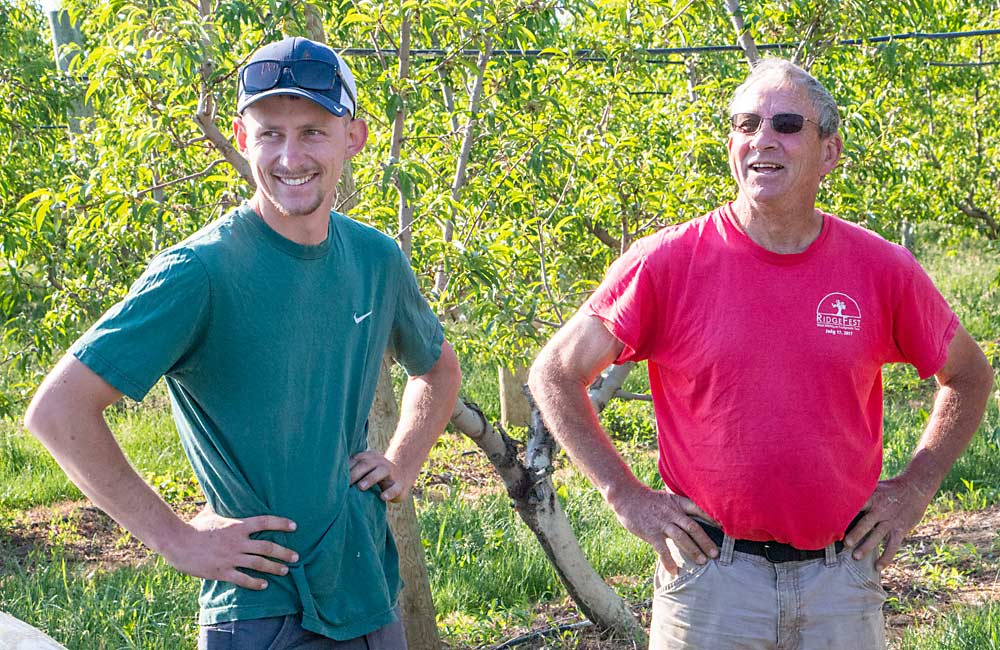
Rasch said he’ll probably use Accede on his peaches, but he might not need it every year. Spring freezes can kill a lot of peaches some years, making chemical thinning unnecessary. In a normal year he would probably spray Accede once, maybe twice. He might hedge his bets against freeze loss by spraying just the tops of trees during the second application, or even during the first application if he’s really worried. That’s because the tops of trees are generally more expensive to hand thin, due to the need for ladders, and don’t generally get as much freeze damage as the lower limbs.
Rasch doesn’t expect Accede to completely replace hand thinning, but he said if the chemical thinner can cut the crop load in half, it will still save him a lot of time and money.
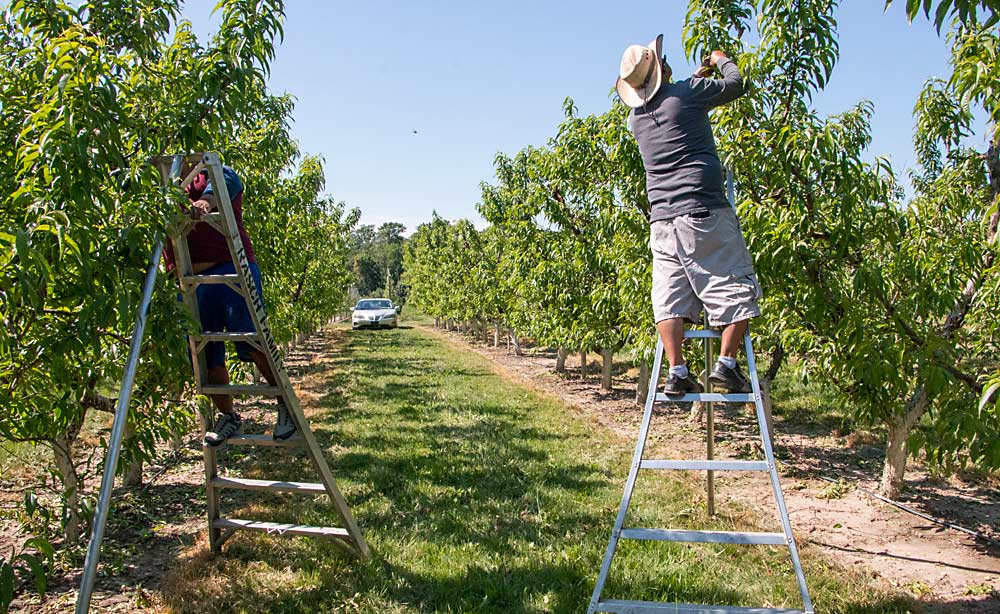
University of Georgia peach researcher Dario Chavez evaluated Accede in grower tests and research trials in Georgia in 2021. He said the resulting fruit set reductions were encouraging. Cultivars varied in their response to Accede, but developing a program of multiple applications at different bloom development stages may allow Georgia growers to adequately address such variation, Chavez said.
Apples
As an apple thinner, Accede works best as part of a season-long program, Wallis said.
Along with peaches, Wallis and Schwallier conducted Accede trials on apples in the past two years. They found that Accede performed best on apples in the “rescue” thinning window, when fruitlets are about 20 millimeters in diameter. Standard chemical thinners such as MaxCel (6-benzyladenine) and Sevin (carbaryl) are not as effective during that stage but should still be used in earlier thinning windows, she said.
University of Massachusetts researchers Duane Greene and Jon Clements also found in their trials that Accede worked better as a late thinner, when fruitlets are at the 15- to 20-millimeter stage and it looks like the crop will still need considerable hand thinning.
In 2021 trials, four apple growers were instructed to apply Accede at a rate of 200 to 400 ppm during the 15- to 20-millimeter window. Clements said thinning results varied by orchard and variety. “Golden Delicious” types, including Gala and Jonagold, were sufficiently thinned, needing little or no follow-up hand work. “McIntosh types,” however, were largely unaffected. Accede’s effects on Honeycrisp are still to be determined. More research on timings and varieties is needed, he said.
Greene has noted some leaf yellowing after Accede applications, but it has not been severe and he doesn’t consider it to be a problem.
—by Matt Milkovich

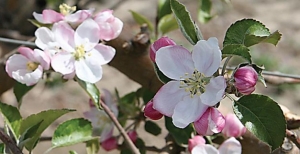





Leave A Comment